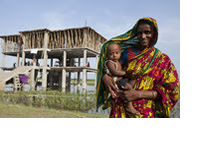

As 2018 comes to a close, join us as we share a few key global health events, milestones and highlights from the past year of our efforts at the U.S. Agency for International Development (USAID) to prevent child and maternal deaths, control the HIV/AIDS epidemic and combat infectious diseases.
 | Three is a Magic Number (for NTDs!)It was a BIG year for eliminating neglected tropical diseases (NTDs) as a public health problem in three USAID-supported countries. Ghana and Nepal said goodbye to trachoma, the leading infectious cause of blindness, and lymphatic filariasis (elephantiasis) got kicked to the curb by Vietnam. Read more. |
 | 2018 Acting on the Call ReportIn June, USAID launched its 2018 Acting on the Callreport, detailing how the Agency partners with 25 countries on their journey to self-reliance in preventing child and maternal deaths, which can yield an average 6 to 1 return on investment, resulting in $26.9 billion made available to the health sector by 2025. Read more. |
 | ATscale: Partnership for Assistive TechToday, over one billion people need assistive technology (AT), yet more than 900 million people do not have access to the wheelchairs, eyeglasses, hearing aids, prosthetics and other life-enhancing AT they need. To address this issue, USAID and partners launched ATscale: A Global Partnership for Assistive Technology. Read more. |
 | Flagship Multi-Sectoral Nutrition ProjectIn October, USAID announced the launch of the Agency’s flagship multi-sectoral nutrition project, USAID Advancing Nutrition, a five-year project that will work to improve the health and nutritional status of vulnerable populations through addressing the root causes of malnutrition. Follow them on Twitter at @NutritionForDev. |
 | Joint Primary Health Care StatementIn October, world leaders for global health gathered for the 40th anniversary of the Global Declaration on Primary Health Care in Astana, Kazakhstan. To articulate an international vision for how primary health care should be implemented now and into the future, USAID developed a joint statement of agreement that major donors agreed to support. Read more. |
 | PMI Expands ProgrammingThis year, 90 million additional people benefited from malaria prevention and treatment through the U.S. President's Malaria Initiative (PMI). In addition to beginning work in Cameroon, Côte d'Ivoire, Niger andSierra Leone, PMI expanded on existing USAID-funded efforts in Burkina Faso. Read more. |
 | Saving Mothers, Giving LifeIn June, the Saving Mothers, Giving Life public-private partnership, of which USAID is a founding partner, shared unprecedented results in reducing maternal and newborn mortality in its final report [PDF, 6.1MB]. During the five-year partnership, maternal mortality in supported districts declined by 44 percent in Uganda; 41 percent in Zambia; and—in only two years—by 28 percent in Cross River State, Nigeria. Read more. |
 | Ebola Bombali Virus DiscoveryFor the first time, scientists discovered a new Ebola virus species in a host prior to detection in an infected human or sick animal. The discovery of the Bombali virus in bats in Sierra Leone and the sequencing of the complete genome was officially published in the journal Nature Microbiology this August. Read more. |
 | World AIDS Day 2018In honor of World AIDS Day, on December 1, 2018, the Agency celebrated the 15th anniversary year of the U.S. President’s Emergency Plan for AIDS Relief (PEPFAR). This year, with partners, the Agency applauded the progress made towards testing, treating and preventing HIV infections around the world. Watch this video and check out @USAIDGH’s Twitter moment to discover more. Read more. |
 | Two Years after the 2016 Zika EpidemicThis year marks two years since the Zika virus epidemicswept through Latin America and the Caribbean, and two years since scientists confirmed the link between Zika virus infection during pregnancy and life-altering birth defects such as microcephaly. During this time, USAID and its partners have been hard at work identifying cases of congenital Zika syndrome, connecting mothers and babies to critical care and support services and strengthening perinatal care services. Read more. |
 | Global Accelerator for TuberculosisAt the 73rd session of the UN General Assembly, USAID Administrator Mark Green announced a new tuberculosis business model, the “Global Accelerator to End Tuberculosis,” which will catalyze investments across multiple countries and sectors to end the TB epidemic while building self-reliance. This innovative performance-based model accelerates action toward enrolling 40 million patients on TB treatment by 2022. Read more. |































No hay comentarios:
Publicar un comentario